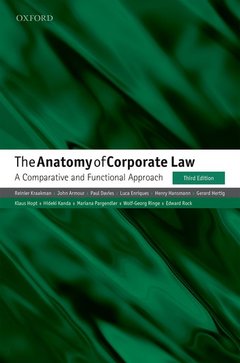Description
The Anatomy of Corporate Law (3rd Ed.)
A Comparative and Functional Approach
Authors: Kraakman Reinier, Armour John, Davies Paul, Enriques Luca, Hansmann Henry, Hertig Gerard, Hopt Klaus, Kanda Hideki, Pargendler Mariana, Ringe Wolf-Georg, Rock Edward
Language: English
Subjects for The Anatomy of Corporate Law:
Approximative price 110.30 €
In Print (Delivery period: 21 days).
Add to cart
The Anatomy of Corporate Law
Publication date: 01-2017
304 p. · 16.5x24 cm · Hardback
Publication date: 01-2017
304 p. · 16.5x24 cm · Hardback
47.09 €
In Print (Delivery period: 21 days).
Add to cart
The Anatomy of Corporate Law
Publication date: 01-2017
304 p. · 16.6x23.3 cm · Paperback
Publication date: 01-2017
304 p. · 16.6x23.3 cm · Paperback
Description
/li>Biography
/li>
This is the long-awaited third edition of this highly regarded comparative overview of corporate law. This edition has been comprehensively revised and updated to reflect the profound changes in corporate law and governance practices that have taken place since the previous edition. These include numerous regulatory changes following the financial crisis of 2007-09 and the changing landscape of governance, especially in the US, with the ever more central role of institutional investors as (active) owners of corporations. The geographic scope of the coverage has been broadened to include an important emerging economy, Brazil. In addition, the book now incorporates analysis of the burgeoning use of corporate law to protect the interests of "external constituencies" without any contractual relationship to a company, in an attempt to tackle broader social and economic problems. The authors start from the premise that corporations (or companies) in all jurisdictions share the same key legal attributes: legal personality, limited liability, delegated management, transferable shares, and investor ownership. Businesses using the corporate form give rise to three basic types of agency problems: those between managers and shareholders as a class; controlling shareholders and minority shareholders; and shareholders as a class and other corporate constituencies, such as corporate creditors and employees. After identifying the common set of legal strategies used to address these agency problems and discussing their interaction with enforcement institutions, The Anatomy of Corporate Law illustrates how a number of core jurisdictions around the world deploy such strategies. In so doing, the book highlights the many commonalities across jurisdictions and reflects on the reasons why they may differ on specific issues. The analysis covers the basic governance structure of the corporation, including the powers of the board of directors and the shareholder meeting, both when management and when a dominant shareholder is in control. It then analyses the role of corporate law in shaping labor relationships, protection of external stakeholders, relationships with creditors, related-party transactions, fundamental corporate actions such as mergers and charter amendments, takeovers, and the regulation of capital markets. The Anatomy of Corporate Law has established itself as the leading book in the field of comparative corporate law. Across the world, students and scholars at various stages in their careers, from undergraduate law students to well-established authorities in the field, routinely consult this book as a starting point for their inquiries.
Reinier Kraakman is the Ezra Ripley Thayer Professor of Law at Harvard Law School and a Fellow of the European Corporate Governance Institute. He has written numerous articles on corporate law and the economic analysis of corporate liability regimes. He teaches courses in corporate law, corporate finances, and seminars on the theory of corporate law and comparative corporate governance. John Armour is Hogan Lovells Professor of Law and Finance at the University of Oxford and a Fellow of the European Corporate Governance Institute. He was previously a member of the Faculty of Law and the interdisciplinary Centre for Business Research at the University of Cambridge. He has held visiting posts at various institutions including the University of Chicago, Columbia Law School, the University of Frankfurt, the Max Planck Institute for Comparative Private Law, Hamburg, and the University of Pennsylvania Law School. His main research interests lie in company law, corporate insolvency law, and financial regulation, in which areas he has published widely. He has been involved in policy projects commissioned by the UK's Department of Trade and Industry, Financial Services Authority and Insolvency Service, the Commonwealth Secretariat, and the World Bank. He currently serves as a member of the European Commission's Informal Company Law Expert Group. Paul Davies is a Senior Research Fellow in the Centre for Commercial Law at Harris Manchester College, University of Oxford. He was the Allen & Overy Professor of Corporate Law, University of Oxford, between 2009 and 2014. Between 1998 and 2009 he was the Cassel Professor of Commercial Law at the London School of Economics and Political Science. He was a member of the Steering Group for the Company Law Review which preceded the enactment of the Companies Act 2006, and has been involved recently in policy-related work for the UK Treasury. His most recent works include the 10th edition of Gower and Davies, Principles of Modern Company
© 2024 LAVOISIER S.A.S.




